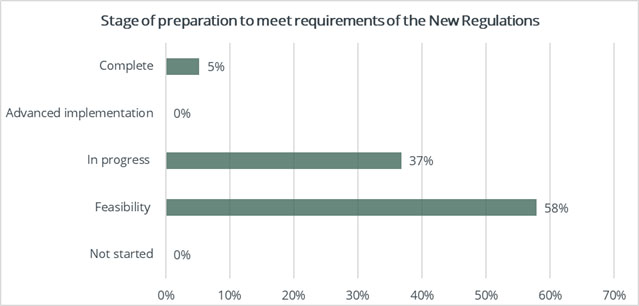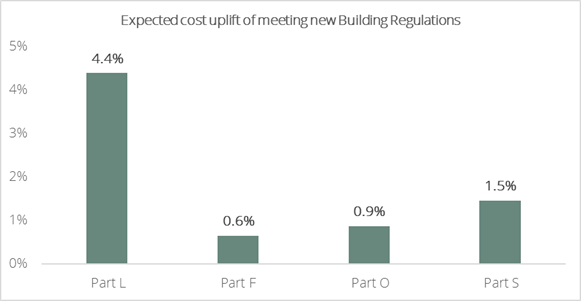Published: 15/06/2022
Housebuilders estimate costs to increase as government aims to deliver its Zero Carbon Ready Homes by 2025, with Part L “Conservation of fuel and power” set to come in force this month. From the 15th of June, new homes in England will have to produce approximately 30% less CO2 compared to current standards.
As part of BCIS Private Housing Construction Price Index survey, BCIS has asked housebuilders about their readiness to meet the new standards and their assessment of how much it would cost.
Back in April, the Federation of Master Builders reported the results of its research, where 52% of builders surveyed were not prepared for or not aware of changes to the Building Regulations, highlighting a need for guidance from the government on the changes.
Nearly 60% of housebuilders completing the BCIS survey said that they are at a feasibility stage, focusing on researching and trialling different solutions for meeting Part L. A quarter of this group noted that they are trialling air source heat pumps (ASHP), 36% noted Gas Boilers and PV, with the rest noting a combination of gas boilers, PV and ASHPs and/or other solutions (e.g. increasing wall cavity width with mineral wool insulation).
A further 37% reported that they are in progress of implementing selected solutions, with 57% reporting air source heat pumps (ASHP) as a chosen Part L solution and the remaining part selecting Gas Boilers and PV.

The additional cost in meeting the revised Part L requirements has been estimated by the respondents to the survey as between 1.8% and 7% (average 4.4%). Those reported being at the “In Progress” stage of preparation estimated the range of the cost uplift between 3% and 7% (4.9% average).
In addition to the estimated cost of meeting Part L, BCIS asked about estimated cost for meeting Part F (Ventilation), Part O (Overheating) and Part S (Infrastructure for Charging Electric Vehicles). Respondents to the BCIS survey provided following estimates:

Several respondents raised concerns that surging material costs together with the change of regulations may create a strong pressure, which may result in increased house prices.
Some of respondents are ahead of the curve, they have been building in line or beyond the new regulations for several years. Many of their dwellings are reported to be built with ASHPs, PV and battery storage as a standard.
Achieving the Government’s aim to deliver Zero Carbon Ready Homes by 2025 will be demanding. The first stage of this process will be particularly challenging in an environment of rapidly increasing material costs, general supply issues and the particular strain on supply chains for new technologies.
In the short term there may well be supply constraints on materials and labour trained to deliver the new technologies. Typically, over time new technologies improve in efficiency and reduce in cost as they become the ‘norm’ however it will be some time before these benefits are felt. In the meantime many housebuilders will be getting to grips with delivering these significant changes.
We thank all the respondents to the BCIS Private Housing Construction Price Index survey for their contributions.
